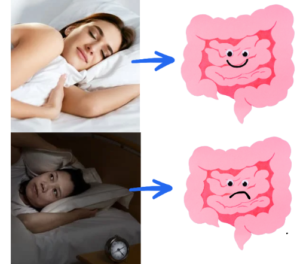The role of sleep in digestion
Quality sleep is crucial for proper digestion, even though its impact may not be immediately apparent. The relationship between sleep and digestion is intricate and multi-dimensional, involving various physiological processes. The circadian rhythm governs the sleep-wake cycle, called the body clock. The circadian rhythm plays a crucial role in regulating the digestive system, leading to a predictable feeling of hunger at specific times of the day.
Rest and restoration 
Getting enough sleep is crucial for the body to heal, revitalise, and restore itself. The deep stages of sleep are critical. Throughout this period, the organs, tissues, and cells comprising the digestive system have the opportunity to not only rest but also undergo necessary repair. During deep sleep, the body focuses on cellular repair and growth, ensuring optimal functioning and rejuvenation. One crucial aspect is the repair of the cells that line the digestive tract. These cells endure constant exposure to food particles and digestive juices, leading to wear and tear over time. Proper sleep is essential for regenerating cells, particularly those in the gastrointestinal lining, which enhances digestion and maintains its integrity.
Getting a good night’s sleep is crucial for maintaining a robust immune system. This is especially important for the digestive system, which relies on its specialised immune cells activated by the beneficial bacteria in the gut. These immune cells safeguard the gut and digestive system from potentially harmful microbes.
The digestive organs play a crucial role in the detoxification process by efficiently eliminating waste and harmful substances. Deep sleep enhances the efficiency of the liver and kidneys, promoting optimal functioning.
Gut Motility
Efficiently moving food and waste through the digestive tract is a crucial aspect of digestion. Gut motility undergoes some alterations during sleep. While you’re catching some Zs, whether in a deep slumber or a lighter snooze, the pace at which your gut moves is noticeably slowed down. This slowdown is an essential adjustment where the digestive system conserves energy, which is then redirected towards repairing digestive tissues. By optimising digestion during the day, you can enhance its efficiency.
The migrating motor complex is a rhythmic pattern of contractions that occurs in cycles when an individual is not consuming food. This includes periods of intentional fasting and sleep, during which fasting happens naturally. This process is crucial to gut motility, effectively clearing away any lingering food particles and debris within the digestive system. By cleansing the digestive tract, you can effectively minimise the risk of bacterial overgrowth and promote a balanced and thriving gut environment. The migrating motor complex is most active at night when the person is fasting and asleep—emphasising the significance of sleep for maintaining optimal digestive system health.
Upon awakening, the natural rhythm of your digestive system begins to pick up pace. This primes the digestive system, ensuring it’s fully prepared to process and break down food efficiently. Additionally, it can initiate the initial bowel movement of the day, highlighting the intricate connection between sleep and gut motility.
Hormone Regulation
Ghrelin is known for stimulating appetite, earning it the nickname “hunger hormone.” Leptin plays a crucial role in signalling to the brain that the stomach is satisfied, effectively curbing the individual’s appetite. Due to this fact, this hormone is commonly referred to as the satiety hormone. Insufficient sleep can have a detrimental impact on these hormones.
A night of poor sleep can disrupt digestion by increasing ghrelin levels. Not only does this enhance your appetite, but it can also trigger a strong desire for carbohydrates. Many people can relate to the sensation called ‘hangry’. Not getting enough sleep can have a negative impact on leptin levels, which in turn disrupts the signal that tells us to stop eating. This combination can lead to a problematic situation where the person indulges in excessive eating, consuming potentially unhealthy foods, and struggling to recognise when to stop. Occasional nights of restless sleep won’t have a significant impact.
On the other hand, chronic insomnia can have a profound impact on the gut, triggering inflammation and giving rise to a range of digestive problems. These can include liver disorders, gastroesophageal reflux disease, inflammatory bowel disease, and even colorectal cancer. Additionally, weight gain may also become a concern.
Disrupted sleep
Disrupted sleep can also result in digestive problems. Working shifts, particularly night shifts, and dealing with jet lag can seriously disrupt sleep patterns and reduce the body’s natural rhythm. Similarly, consuming food late at night or irregularly can adversely affect sleep. Natural sunlight regulates the circadian rhythm of sleep.
Regrettably, in our modern era, we spend the majority of our waking hours indoors. As a result, the connection between being outdoors and reaping the advantages of natural light is being overshadowed by the prevalence of blue light emitted by electronic devices such as laptops, televisions, mobile phones, and artificial lighting. Exposure to these light sources before bedtime can disrupt your sleep cycle and patterns.
The combination of these factors can lead to symptoms such as diarrhoea, ulcers, and inflammatory bowel disease or disrupt the delicate balance of bacteria in the gut. It also has the potential to harm the gut lining.
Microbiome Health
The microbiome refers to the vast collection of trillions of microbes that reside in the gut. These consist of beneficial bacteria, commonly referred to as probiotics. However, it also encompasses viruses, fungal cells, and specific pathogenic bacteria. Microbes play a crucial role in maintaining overall health, including digestive health. They enhance the immune system, assist digestion, and contribute to the production of vitamins, enzymes, hormones, and amino acids. New research has revealed the fascinating connection between the microbiome and sleep, shedding light on yet another way it contributes to human health. Disrupted sleep or chronic insomnia can profoundly affect the delicate balance of microbes in your body, ultimately affecting your digestive health and overall well-being.
Interplay between the microbiome and sleep
Nevertheless, the relationship between sleep and the microbiome is intricate and highly complex. Sleep quality has a profound impact on the microbiome, while the microbiome’s health also influences sleep patterns. Understanding the complicated relationship between sleep and the microbiome is no easy task. However, a study discovered that having a substantial amount of specific bacterial cells in the gut and a diverse range of these cells has been associated with falling asleep faster, experiencing fewer awakenings, having fewer interruptions during the night, and enjoying more restorative sleep. Although it is not feasible to cover all the findings in this article, the main message is that maintaining a healthy balance of beneficial bacteria and promoting a diverse range of bacteria in the gut yields positive results for sleep, digestion, and overall well-being.
Stress, sleep and digestion
Insufficient sleep is a common consequence of stress and anxiety. Similarly, these mental health conditions can also impact the physical health and functioning of the digestive system. These factors can affect gut motility, leading to indigestion, ulcers, and irritable bowel syndrome. Stress significantly impacts digestion, primarily because of cortisol, commonly known as the stress hormone.
Cortisol
When detected, cortisol triggers the body’s natural response of fighting or fleeing. As a result, blood flow is redirected to vital organs such as the heart, brain, lungs, and muscles in the limbs, while the digestive system receives less blood. This empowers individuals to confront or escape from whatever is triggering the peril and intense stress. During ancient times, this creature would have been considered a formidable predator.
Nowadays, stress can arise from various sources that may not be life-threatening, such as financial obligations, heavy workloads, or insufficient sleep. Redirecting blood flow, as described, is highly effective in situations where one needs to escape from a predator quickly. This technique ensures that blood flow returns to normal once the threat has subsided. Unfortunately, in today’s fast-paced world, chronic stress can take a toll on our digestive system, particularly gut motility. This can result in unpleasant symptoms such as constipation, diarrhoea, indigestion, gas, and bloating. Effective stress management strategies are crucial for maintaining optimal gut health and promoting restful sleep.
Getting ample sleep is crucial for maintaining a healthy digestive system, as sleep and digestion are closely intertwined. It is highly beneficial to prioritise good sleep hygiene. To optimise your sleep quality, it’s essential to take specific measures. These include reducing your exposure to blue light emitted by electronic devices, maintaining a consistent sleep schedule, creating a cool and dark sleeping environment, avoiding eating within two hours of bedtime, and getting some natural daylight exposure during the day, particularly in the morning.
References
Digestive health and circadian rhythm
Sleep dysfunction and digestive conditions
The link between the gut microbiome and sleep
Stress and the digestive system
The Article: How Sleep Affects Your Digestive System Appeared First On Nutritionist Pershore.
The Article: The Impact of Sleep on Your Digestive System appeared first on Jane Stevens.
The Article The Impact of Sleep on Your Digestive System Was Found On https://limitsofstrategy.com






You’ve raised an interesting point about the often-overlooked connection between sleep and digestion. I’ve experienced firsthand how my own digestive issues tend to flare up during periods of poor sleep. It seems that while many of us focus on diet and exercise for digestive health, the importance of sleep is frequently underestimated.
It’s interesting how often we overlook something as fundamental as sleep when it comes to our overall health, isn’t it? I can definitely relate to your experience with digestive issues flaring up during those restless nights. There seems to be an intricate balance between our sleep patterns and how our body processes food. I read somewhere that poor sleep can impact the gut microbiome, which in turn affects digestion—it’s almost like a vicious cycle.
I completely agree; sleep really is one of those foundational aspects of our health that often gets pushed to the side. It’s interesting to think about how interconnected everything is—like how our moods, stress levels, and even our eating habits can all spiral when we’re not getting enough rest. It’s almost ironic how we think we can power through with less sleep, but it ends up making other things—like our digestion—so much worse.
I totally get where you’re coming from; it’s fascinating how sleep and digestion are intertwined—speaking of which, I recently came across some insights on how fasting could complement our efforts in weight management, which might be worth exploring together.
‘Optimising Weight Loss through Fasting’
https://stop-global-warming.co.uk/optimising-weight-loss-through-fasting/.
You’ve hit on such an important point about the interconnectedness of our health. It’s ironic how we try to cut corners on sleep, thinking we’re being productive, when in reality it often leads to more issues down the line—like increased stress or even poor digestive health. It’s definitely a cycle that can be hard to break.
You’ve brought up a key observation about the false economy of sacrificing sleep for productivity. It’s something many of us have fallen into, thinking we’re getting ahead by burning the midnight oil. But the paradox is striking—what seems like a shortcut often becomes a detour into a maze of problems. Poor sleep isn’t just about feeling groggy or unfocused the next day. It can trigger a cascade of health issues that manifest in unexpected ways.
You’ve hit on such an important point about the interconnectedness of our health. It’s ironic how we try to cut corners on sleep, thinking we’re being productive, when in reality it often leads to more issues down the line—like increased stress or even poor digestive health. It’s definitely a cycle that can be hard to break.
I really resonate with what you said. It’s true—so many of us underestimate the power of sleep and its ripple effects on other aspects of our health. I’ve found that my mood really takes a hit when I don’t get enough rest, and it often leads me to cravings for sugary snacks or caffeine to compensate, which just creates a vicious cycle.
I completely relate to what you’re saying about the impact of sleep on mood and cravings. It’s interesting how our bodies signal for more energy when we’re tired, often leading us to reach for those quick fixes like sugar or caffeine. I’ve definitely found myself in that same cycle, especially during busy weeks.
You bring up such an important point, and it’s something I’ve found myself grappling with as well. Sleep often gets overlooked, yet it plays such a crucial role in our overall well-being. I sometimes think about how we treat sleep like an optional extra in our routines—like staying up late to binge watch a series or scrolling through our phones instead of winding down. It’s fascinating how the body works, isn’t it?
You really nailed it with that observation about sleep and health. It’s so easy to brush off sleep as just “down time,” but it really has this deep impact on everything else happening in our bodies. When I went through that stretch of restless nights, it wasn’t just my mood that took a hit; it really felt like a domino effect on my digestion too.
I can relate to your experience. It’s interesting how interconnected our body systems are, and sleep often gets sidelined in discussions about health. I’ve noticed that when I’m not sleeping well, my entire routine feels off—the way I digest food, my energy levels, and even my mood. It’s as if my body goes into survival mode, which isn’t great for digestion.
This is such an enlightening exploration of the connection between sleep and digestion! I’ve often noticed how my eating habits impact my sleep and vice versa. For instance, if I indulge in a heavy meal too close to bedtime, my sleep quality definitely suffers, leaving me feeling sluggish the next day. It’s fascinating how our body’s internal clock regulates not just our hunger but also our metabolic processes.
It’s great to hear how you’ve connected your eating habits with your sleep patterns. It’s interesting how our bodies send us signals about what works best for them, isn’t it? You’re spot on about heavy meals close to bedtime—it can turn a restful night into a struggle.
I really appreciate what you said about how our bodies send us signals. It’s so true—listening to those cues can be a gamechanger. I’ve noticed that certain foods not only affect how I sleep but also my overall energy levels the next day. For instance, I used to enjoy late-night snacks like popcorn or ice cream, but I realized they would leave me feeling restless in the morning.
I totally get what you mean about how our bodies send us signals. It can really be eye-opening once we start paying attention to those cues—how certain foods impact not just our sleep but our mood and energy levels is fascinating. I used to have a similar relationship with late-night snacks. For a while, I thought they were just a little indulgence, but I noticed the same pattern: indulging in sweets or heavy snacks would often lead to restless nights and foggy mornings.
Speaking of tuning into our body’s signals, I recently came across some techniques that might help navigate anxiety and could really complement what you mentioned about those food cues.
‘Anxiety Control Techniques to Conquer Your Fears’
https://stop-global-warming.co.uk/anxiety-control-techniques-to-conquer-your-fears/.
You’re so right about the signals our bodies send us. I’ve noticed that my eating habits really play a pivotal role in how well I sleep. There’s something to be said about finding that balance—like, I used to think I could just eat whatever and then crash in bed, but those late-night snacks definitely tell a different story.
I recently came across an interesting piece that dives into the different varieties of catnip, and it got me thinking about how our furry friends can also benefit from understanding what suits them best.
‘Catnip Varieties: Discovering Feline-Friendly Flavours ‘
https://stop-global-warming.co.uk/catnip-varieties-discovering-feline-friendly-flavours/.
You bring up an important point about how our eating habits intertwine with our sleep patterns. It’s fascinating to realize how much impact our diet has on how we feel, both physically and mentally. Late-night snacks can seem harmless at the moment, but they often come back to haunt us when we’re trying to get some quality rest. I’ve found that adopting a mindful approach to eating—like savoring meals rather than rushing through them—helps not just with digestion but also with sleep quality.
You’ve highlighted a key aspect that often gets overlooked. It’s intriguing how our relationship with food can play such a significant role in our overall well-being. Personally, I’ve noticed that when I indulge in late-night snacks, it’s usually tied to stress or fatigue. It’s almost like I’m subconsciously reaching for comfort, even though I know it can disrupt my sleep.
It’s interesting how closely our eating habits connect with our overall well-being, especially when it comes to sleep. Many of us don’t realize how certain foods can affect our bodies in different ways. Those late-night snacks might feel comforting in the moment, but they can disrupt our sleep cycles and leave us sluggish the next day. Finding that balance isn’t always easy, but tuning into how your body reacts can really guide you in the right direction. It’s all about experimenting and listening to what feels right for you.
It’s great to hear your thoughts on this! It’s interesting how intertwined our body’s rhythms are, isn’t it? That heavy meal close to bedtime can really throw everything off. I’ve had days where I thought a late-night snack wouldn’t hurt, but then I end up tossing and turning all night.
It’s interesting how interconnected our body systems are, isn’t it? I’ve definitely noticed that too—eating a heavier meal before bed can really disrupt sleep quality. It’s like our bodies are trying to multitask, digesting while we’re supposed to be resting. A lighter evening meal or wrapping up dinner a few hours before bed usually helps me feel more refreshed in the morning.
You’re spot on about how interconnected our body systems are. It’s fascinating to think about how we sometimes overlook the logistics of digestion, especially when we’re in “relaxation mode” in the evening. When you eat a heavier meal right before bed, your body’s energy shifts from resting to dealing with digestion, which can definitely knock your sleep off-kilter.
You’ve touched on something really important about how our bodies handle food and rest. It’s pretty fascinating when you think about it—our bodies are always busy, even when we’re trying to wind down for the evening. Eating a heavy meal can really throw off our systems. I’ve also felt the difference when I’ve eaten too close to bedtime; it’s like my stomach doesn’t know it’s time to chill out.
It’s interesting how you’ve noticed that direct link between your eating habits and sleep quality. Many people tend to overlook these nuances, but our bodies are finely tuned to respond to the choices we make throughout the day. When you indulge in a heavy meal late in the evening, your body is busy working through the digestion process when it should be winding down for rest, which can lead to that sluggish feeling the next day. It’s a reminder that our routines—what we eat and when we eat—play a major role in how we feel both physically and mentally.
I completely agree with you about the link between eating habits and sleep quality. It’s fascinating how interconnected our routines can be. I’ve definitely experienced that sluggish feeling after a late-night heavy meal, and it’s such a stark reminder of how our bodies are always in tune with our choices. I’ve started to pay more attention to what I eat in the evening, opting for lighter meals and incorporating more whole foods. It’s surprising how just a small tweak can influence not only sleep but also my overall mood the next day.
I found your exploration of the connection between sleep and digestion to be quite enlightening! It’s fascinating how often we overlook the intricate relationship between our sleep patterns and our digestive health. Personally, I’ve noticed that when I prioritize good sleep hygiene—like maintaining a consistent sleep schedule and creating a restful environment—I not only feel better rested but also experience fewer digestive issues. It’s almost like my body has the chance to reset itself during those deep sleep stages.
It’s great to hear that you’ve noticed such a positive change by prioritizing sleep hygiene. The connection you mention does make a lot of sense. When we’re in deep sleep, our bodies go into repair mode—this includes the digestive system. It’s interesting how creating a peaceful environment and sticking to a regular sleep schedule can create a ripple effect on our overall well-being.